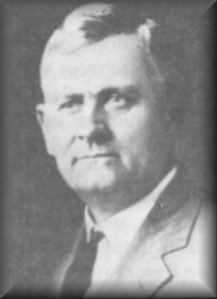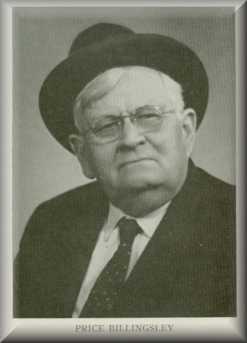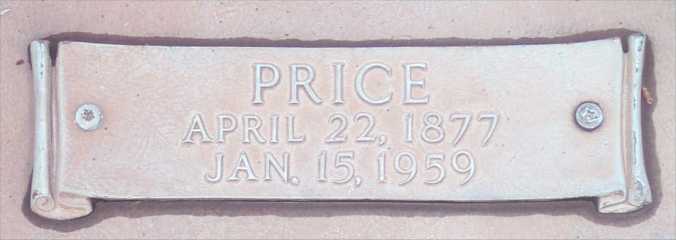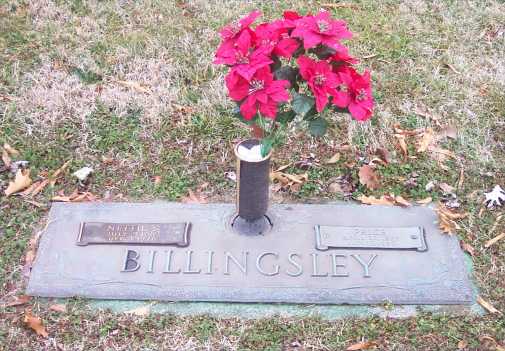Price Billingsley
(1877-1959)

Biographical Sketch On The Life Of Price Billingsley
Price Billingsley was in many respects a very unusual man. He grew up without any formal schooling, yet "lifted himself by the boot straps" and became on of the most useful and successful gospel preachers of his time. He went far and wide with The Word in a day when that was not easy to do, and reached many of the lost with the life-saving Word. Thousands of people became obedient to The Lord as a result of his efforts, and he established the Cause in many places where it is now strong and well established. His financial support was very limited, and like most gospel preachers of his time, he literally lived "from hand to mouth", not because they were "poor managers," but because the brethren had not been taught to adequately support them.
He was born April 22, 1877, near Corinth, Mississippi, of Benjamin F. and Catherine Campbell Billingsley. They were faithful Christians and reared their three sons and three daughters in The Faith. In 1889 Price was baptized into Christ by John T. Underwood. We presume it was near his home in Mississippi, but do not know. He became a well educated man and left a large amount of written material, including a very interesting diary that covers many years of his active life. This material is now preserved for future generations in the library of Abilene Christian University. This diary is an unending source of information and inspiration. ( I thought I would just scan it, but found myself eagerly reading every word.) He began preaching in Blackburn, Louisiana in 1898. (The family has some material that indicates he started about ten years before that, but this is the date that he gave in Preachers of Today, 1952.) The diary was not started until the first of January, 1901, but we can presume that these first years were spent like those that followed. Very few preachers were then engaged in "local work," but they preached in every place at every opportunity. This might be any day or evening of the week, and could be in a private home, a brush arbor, a courthouse, a schoolhouse, and would sometimes be in a church house that might be owned by any of the religious groups in the area. In the diary he faithfully listed all these places, noting the size of the crowd, how many sermons were preached there, how many responded to the gospel, and any other unusual event. He kept careful financial records. He never spoke of having been "paid" so much. He always used the word: "received.". (I wonder if this choice of terms does not reveal a subtle difference between the thinking of preachers then and now?) He listed his own contribution, which might be from ten to twenty-five cents, though sometimes he gave a dollar. He would usually "receive" such amounts as" $3.00, 4.10, 1.00, .25, and sometimes, it was nothing. Though as he grew in experience, this item grew some, but probably was inadequate to support a family for most of the years of his life, at least until he began to work "full time" for some of the good churches for which he worked in later years. In the year 1902 he "received" a total of $8.50 in January; 10.87 in February; and 12.25 in March. Once he mentioned having conducted a funeral for which he "received" a dollar, but it cost him eighty cents to get there. Until the end of 1904 he was a single man and enjoyed mixing and mingling with the young ladies, as would any young man. He often mentioned a certain one by name, using only her first name. He never gave much indication that he was serious with any of them, including the one he married. In February of 1901 he went from Hamilton to Thorp Springs, spending fifty-five cents getting there. He also spent $9.70 for a pair of pants and a "good shaving outfit." In Thorp Springs he heard J.D. Tant and J. W. Chism, and was well impressed with each of them. This must have been some kind of a special meeting, for he mentioned "some good times with the girls, some very pretty ones." He spent twenty-five cents there. In the diary he often mentioned the names of families with which he stayed, the weather and condition of the crops, which would be a matter of much importance in an agricultural society. He had begun preaching in Louisiana, and the diary does not tell when he went from there to Texas, but in these early years he preached in many places such as: Center Valley, Live Oak, Hamilton, Leesville, Gentry's Mill, Pearl, Oakton, Joshua, (where he met and stayed with Joe S. Warlick, who was probably there in a meeting.), Brookhaven, Corrigan, etc. He seemed to have been subject to periods of despondency, for sometimes the diary will say: "I am so sad," yet nothing would indicate the cause of this sadness. These statements are rather common, and sometimes such a statement would be the only thing to indicate his feelings for a certain girl. Once he said: "God keep me from such sorrow as I am now bearing." No further information about this "sorrow." He often mentioned his study habits, which always included extensive reading in both the Old and New Testaments, and he always told what he was reading. From time to time he would mention some secular subject he was working on, such as Civil Government, or some such subject. Sometimes he would chide himself for getting careless in his studies, and evidently resumed his diligent study habits. This would not be easy to do, when one considers the great amount of time he spent in travel. In those first years he did not mention any place as being "home," but perhaps Hamilton filled that need. He must have lived with the brethren from place to place, which a single man could easily do, while a married man could not. On January 22, 1901 he performed his first wedding ceremony, for which he "received" two dollars. Three days later he went from Gentry's Mill to Hamilton where he bought a fountain pen and a pair of shoes, for which he spent $3.95. (A 1902 Sears & Roebuck catalog lists fountain pens ranging in price from a few cents to $4.00 for a gold one; and men's shoes are listed from about seventy-five cents to $2.85.)
His first real preaching trip seems to have taken place early in 1900 when he left Hamilton "astride my faithful old farm horse, Higdon," headed for East Texas. Some unnamed friends in East Texas had written him suggesting that he could "probably do good in that destitute region," then they hasten to add that they were too poor to offer financial aid. He felt he "must" preach, and so he went with practically no money, very few clothes, but he did have a ". . .kind of a letter of introduction from a well wisher," which he must have used at appropriate times along the way. Apparently, he located brethren in the communities through which he passed, and preached when he could, saying: "I literally begged for a chance to preach, and kept dogging along on my eastward journey." He finally arrived at his destination, though I was unable to tell exactly what it was. He did much preaching and baptized quite a number of people, thus making him feel that the trip had been successful. He returned to Hamilton about three months later when the blue bonnets were blooming.
In 1901 he was still at work and began that diary the first of that year. His work took him to more and more places, and in May he was back in East Texas, where he had a portrait made in Lufkin. He spent $2.80 there, which may have included more than the picture cost. He then went to Shreveport in Louisiana where he was robbed of $20.40, and concluded the diary entry for the day with: "I am in a peck of trouble." He was next in Plain Dealing, but did not say how he got there in view of his "peck of trouble." He preached three times in Plain Dealing and "received" a total of $12.80. He then went to Daingerfield, Rocky Branch, and Paris in Texas, where he heard T.B. Larimore, and bought another fountain pen, spending $3.50 in Paris. He visited a number of places and in July was back in Hamilton, where he heard "Weeping Joe" Harding. He said of Harding: "...he is a grand old man, been preaching for thirty-one years." Later that month he was in Leesville selling subscriptions to the Firm Foundation along with his preaching.
On Monday, July 29, 1902, he rode the train to Wynnewood, Indian Territory, going immediately to Elmore, west of Wynnewood, where he held a meeting. Brethren were meeting there and he had a good meeting, with several additions. Following this he returned to Wynnewood, intending to preach, but did not, saying: "this is a bad town - bad brethren." While on this trip he visited and preached in Foster, Pauls Valley, Purdy, where he "set the church in order" - appointed elders, then to Tussy where he preached a few days and had a debate, his first, with Dr. F.H. Redwine, whom he described "as not very able." He did not say what they debated about. He returned to Texas, stopping in Gainesville, then to Blue in the Indian Territory, where he did some preaching before returning to Texas. On October first he "started East," having bought a new suit of clothes for this trip, ($8.00 to $20.00 in the 1902 catalog.) On this trip he heard J.W. Chism debate a man named Pirtle on the subject of baptism. He described Pirtle as "a rascal" and felt quite sure that Brother Chism had won the debate.
The year 1902 started off a little differently, for
he now had regular Sunday appointments, with the first Sunday being spent with
the Center church, the second with Holly, the third with Weldon, and the fourth
with Lovelady. This continued through the Spring, but all was not well, for on
March 4, he wrote: "Brother Ferman is giving me so much trouble now. He is
very unfair." He did not reveal the nature of the trouble, nor the outcome.
He was now doing some writing for the Firm Foundation which was mentioned in the
diary. In April he was in Crockett, where he spent $17.00 "for some good
clothes." The summer of 1902 was spent in meeting work in Texas, Arkansas
and Louisiana. In September he visited the State Fair in Dallas for a day and
on to Austin where he bought $12.00 worth of books from the Firm Foundation. In
May of 1903 he went to Louisiana to visit Miss Nettie. (Though he did not give
her last name, we now know it was Shockley.) In September of that year he was in
Abilene, beginning one of the most significant periods of work in his entire
life. According to Stephen D. Eckstein in his "History of the Church of
Christ in Texas," W.L. Gibbs had arrived in Abilene in 1883 and began
preaching. He had soon gathered several brethren and soon had a church of about
sixty members which continued to prosper until the organ controversy was
introduced. The pro-organ majority took the building, and the conservatives
seem to have been left out. Gibbs pleaded through some of the church papers for
help in providing a building for them, but none came, and this group must have
quit meeting. However, all over that part of Texas loyal churches were being
planted and from a nearby town Albert and Cornelia McDonald moved into Abilene.
They began worshipping with the digressives, but soon became dissatisfied. In
1903 he secured a house and brought Price Billingsley to hold a meeting.
Brother Billingsley was quite successful in the many meetings he held there
through the years, and was able to permanently establish the cause of New
Testament Christianity, and is therefore often mentioned as the preacher who
began the church in Abilene. For many years he was closely connected with it,
and helped in the founding of Abilene Christian University. 
He continued to preach in West Texas and planted The Cause in a number of the towns near Abilene. A short time before Christmas in 1904 he got a letter from Nettie in Louisiana telling him that she was calling off the plans for their wedding. He had not indicated in the diary that things between them were this serious, and this threw him into another period of despair, causing him to exclaim: "Oh God, what trouble." The following day he received a telegram from what must have been a male member of Nettie's family, and the next day was spent on the train going to Louisiana. On Saturday, the 24th, he arrived in Blackburn, where she lived, and though he did see her that evening, nothing was said to indicate anything about her reception of him. The entry for December 25th is quite short. It says: "At ten minutes before ten this morning I was married to Miss Nettie Shockley." They went to Abilene where they established a home, and he continued preaching. No children were born to them, but they did adopt two daughters and a son, Robert, who is now dead. Their daughters are: Roberta Hazelwood and Dorothy Jean Blazer.
Another place where he had a significant part in the establishment of The Church was in the city of Wichita Falls. In 1908 a faithful Christian lady, Tenny L. Colburn, asked for help in planting the Church there. Brother Billingsley answered this call, going there with a tent in April to hold a meeting, which he did in what is now the downtown section. At first he was very discouraged because so few came to hear him, and the digressive preacher openly fought him, but he kept working and the Tenth and Broad St. church of today is the result of that original effort. That such men were able to accomplish so much with so little, says much about their ability and devotion. (When he first went there he was unable to even buy a postage stamp.)
As the years passed his work broadened, and he came to be recognized as one of the very best preachers. He had a number of debates, wrote for the Firm Foundation, Gospel Advocate and possibly others, including his own paper, the Gospel Advance, which he published for a time from Nashville, Tenn. He published a book, "Springs of Church Might," which had a good circulation. Near the end of life he was involved in publishing a story of his life, and he got the material together, or at least, most of it. If he ever got it published, we have been unable to locate it. He also did some secular writing in such papers as the two noted daily papers in Nashville. The later years of his life were spent in "local work," and this included such places as Charlotte Avenue in Nashville; Hopkinsville, Kentucky; Meaford, Ontario; and Ft. Worth, Texas. There were times when he augmented his income selling insurance.
Arthritis and heart trouble hindered much in the last years, making it necessary for him to curtail his preaching activities. Support across the years had never been overly generous, and there were (and is not) no provisions for taking care of our preachers in their old age. His children took care of him. Finally, on January 13, 1959, in the Davidson County Hospital in Nashville, Tenn., the Lord released him after a lifetime of hard work and many trials and troubles. Charles Campbell and Joe Sanders conducted the service in Nashville and he was laid to rest in the Garden of Rebecca in Woodlawn Cemetery on Jan. 17, 1959. His companion continued until December 4, 1978, when at the greatly advanced age of ninety-three years, she followed into the better world. Only eternity will reveal the total influence of his life, but certainly many souls will be in heaven because he was on the earth.
- Gospel Preachers Of Yesteryear, by Loyd L. Smith c.1986 Originally Published March, 1980
![]()
Location Of The Grave Of Price Billingsley
Price Billingsley is buried in the Woodlawn Memorial Park Cemetery In Nashville, Tennessee. The Cemetery is located behind the 100 Oaks Shopping Center that faces I-65 just before the I-440 Interchange. From 100 Oaks travel east on Thompson Lane and turn left into the main entrance of the Woodlawn Cemetery. Take your first right and follow the road as it bends back to the left. You will pass The Garden of Rachel, then you will come to The Garden Of Rebecca. Park right in from of the Garden Of Rebecca sign. Travel west behind the sign two headstones and the grave will be just to your right.
GPS: N 36° 06' 50.0 x WO 86° 45' 30.7"
Facing West


See A Map Showing Other Graves At Woodlawn Cemetery
![]()